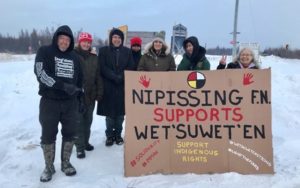Nipissing First Nation lights the fires for Wet’suwet’en

By Catherine Murton Stoehr
JOCKO POINT— People came and went, the convenience store owner made up coffees for folks when they got cold, one man brought rabbit stew, kwewok (women) sang and drummed. The fire started small, but as more people brought more wood, it got brighter and hotter.
The gathering, a Solidarity Fire for Nipissing First Nation and allies to support the Wet’suwet’en,
was announced on Facebook but organized by community members working in consultation with their Chief and Council. The organizer, Nipissing First Nation member Aylan Couchie, recalled when she decided to put something together.
“The night after the [Ontario Provincial Police] raided the Mohawks and the [Royal Canadian Mounted Police] raided Unist’ot’en, Gitxsan people blockaded the highway and I watched the RCMP haul away Elders in regalia.”
The sight brought Couchie, no stranger to the history or current realities of Canada/Indigenous relations, to tears.
“I wanted us to show solidarity, like the Gitxsan, even though we are not their neighbours.”
Though there have been two events in support of the Wet’suwet’en in neighbouring North Bay, both of which Couchie herself supported and one that she was even able to attend, she wanted something especially for the people of Nipissing First Nation to participate in. Both the location, Jocko Point Road, and the timing 3:30pm to 11pm ensured that it was accessible to community members despite work schedules.
“Mostly, it’s just to keep a fire burning— a symbolic gesture,” Couchie said. “Right by the highway, right by the train tracks.”
But also, doing something “centred in who the community is.”
Couchie noted that backlash over the events in British Columbia are affecting First Nations people here, she pointed to the open racism online and in newspaper comments sections and shared that she has been hearing from relatives that they are being verbally accosted in public.
“It’s good for the community, because we are under attack, to enjoy each other’s company, just chatting.”
Nipissing Ogimaa (Chief) Scott McLeod, who warmed his feet at the gathering along with Deputy Chief Muriel Sawyer, cautioned that from this side of the country it can be hard to filter through so many conflicting views of what the Wet’suwet’en people as a community want. Which in his mind, is the thing that matters most. He suggested that many people, including industry and environmental activists, are using the situation to further their own agendas.
Sifting through that barrage of information, “what rises to the top is [the Wet’suwet’en’s] inherent right to govern their own lands and the fact that there are no treaties on their territory” despite the fact that the “1763 Royal Proclamation directed agents of the Crown to make treaties” in advance of settlement or land use. Chief McLeod noted that absent a treaty, the Wet’suwet’en are in full possession of their rights and title.
“The Government of Canada and the RCMP need to back off and give them the space and time they need to come to a decision,” expressed Chief McLeod.
A sign at the event read “It’s not just about pipelines.”
Chief McLeod’s focus on the unequivocal legal fact of Wet’suwet’en political sovereignty and unextinguished land title, and Couchie’s concern over how current events are feeding hatred toward Indigenous people across the country, demonstrate how people in Nipissing First Nation are experiencing the current conflict differently than non-Indigenous Canada. For them, Canada’s economic goals and current energy policy are simply the most recent battlefield on which Indigenous rights are being challenged. Even as they hold the line on those rights, as First Nations, Métis, and Inuit people have done unceasingly for more than two centuries, Indigenous Peoples in Canada must parry an unrelated challenge.
Non-Indigenous Canada’s ignorance of Indigenous rights and history makes the Wet’suwet’en Hereditary Chief’s insistence on a place at the table appear intemperate, even illegitimate. Defence of the Hereditary Chiefs’ legal rights, manifested in rallies and blockades by extension are ironically perceived as contrary to the rule of law. The Canadian media has encouraged this narrative by reporting on the conflicts and negotiations without helping Canadians to understand the actual legal terrain. All of which explains why the Nipissing First Nation Solidarity Fire included an unusual media stipulation.
The stipulation stated that, “ONLY Indigenous-based media will be invited. Local media will be excluded unless they send a First Nations journalist to cover the event.” The stipulation may appear harsh until one remembers the narrative and commentary currently circulated in mainstream media.
As if to vindicate the logic of this ban, a local publication ran an inflammatory article and Chief McLeod noted that his community reached out to support Wet’suwet’en “and all of a sudden it’s about [the non-Indigenous media].”
Chief McLeod praised a Toronto group that figured out a novel way to get the message out while heading off backlash and media misrepresentation. The self identified “Light Warriors for Wet’suwet’en solidarity”, have projected giant images onto Toronto’s iconic buildings:
“Trudeau: Consultation is not Consent”
“Wet’suwet’en Solidarity”
Clearly delighted with the action, Chief McLeod paid the Light Warriors a high compliment.
“I can’t say enough about it; when I saw the projections last night, I was overwhelmed with pride for Indigenous people and what we are capable of.”
Catherine Murton Stoehr is a non-Indigenous writer and historian living on Nbissing land.

